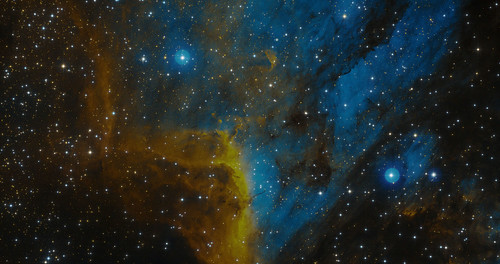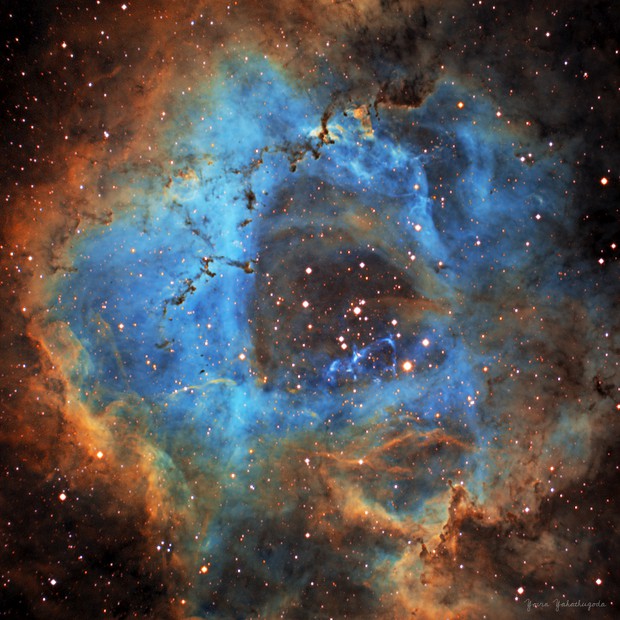Submissions: 2021 July
-
Andromeda 2013
- Science Officer
- Posts: 196
- Joined: Tue Jul 09, 2013 2:11 pm
- Contact:
Re: Submissions: 2021 July
M-42 Orion Nebula
M-42 Orion Nebula & the Running Man
Fit file from Dec 2019. Re-Processed today - no Flats
Original Processing in 2019 here - https://www.flickr.com/photos/92681330@N06/51303864739
Processed by me: P.I. PSCC
Copyright: Daniel Pasternak ©
M-42 Orion Nebula & the Running Man
Fit file from Dec 2019. Re-Processed today - no Flats
Original Processing in 2019 here - https://www.flickr.com/photos/92681330@N06/51303864739
Processed by me: P.I. PSCC
Copyright: Daniel Pasternak ©
-
Andromeda 2013
- Science Officer
- Posts: 196
- Joined: Tue Jul 09, 2013 2:11 pm
- Contact:
Re: Submissions: 2021 July
M-27 Dumbbell Nebula
TAK-106 2600mc L-enhance (1 hour of 300" subs)
C-11 Hyperstar 2600mm 12nm Ha (1 hour of 240" subs)
Both scopes on AP1100gto at the same time.
Total integration 2 hours.
Combined in APP - PI - PScc
Copyright: Daniel Pasternak ©
TAK-106 2600mc L-enhance (1 hour of 300" subs)
C-11 Hyperstar 2600mm 12nm Ha (1 hour of 240" subs)
Both scopes on AP1100gto at the same time.
Total integration 2 hours.
Combined in APP - PI - PScc
Copyright: Daniel Pasternak ©
-
Andromeda 2013
- Science Officer
- Posts: 196
- Joined: Tue Jul 09, 2013 2:11 pm
- Contact:
-
Andromeda 2013
- Science Officer
- Posts: 196
- Joined: Tue Jul 09, 2013 2:11 pm
- Contact:
-
Andromeda 2013
- Science Officer
- Posts: 196
- Joined: Tue Jul 09, 2013 2:11 pm
- Contact:
Re: Submissions: 2021 July
Annular solar eclipse on June 10, 2021
Copyright: Daniel Pasternak ©
-
barretosmed
- Science Officer
- Posts: 484
- Joined: Thu Oct 12, 2017 6:04 pm
Re: Submissions: 2021 July
Messier 6: The Space Butterfly
Nicknamed the butterfly cluster for its resemblance to a butterfly, it is located in the constellation of the scorpion, approximately 1,600 light-years away.
Messier 6 is best seen in binoculars, it is about the size of a full moon. The cluster contains over 300 stars, with binoculars it reveals only a few dozen and a small telescope will show little more.
Its first reports are a mystery, it is believed that its first record was by the Greek astronomer Claudius Ptolemy while observing neighboring Messier 7 (Ptolemy's cluster) in the 2nd century CE, which is just five degrees southeast of M6. In describing the nearby cluster M7, Ptolemy noted 'Girus ille nebulosis' meaning '2 small clouds'.
Best details:
https://www.astrobin.com/full/021sau/0/
EQUIPMENT:
ZWO ASI 6200MC PRO COLED
Espirit 150mm
95 x 100s
Date: . 07/01/2021
Location: Jales-SP-Brazil
Copyright: Fernando Oliveira de Menezes
Email: Barretosmed@hotmail.com
Nicknamed the butterfly cluster for its resemblance to a butterfly, it is located in the constellation of the scorpion, approximately 1,600 light-years away.
Messier 6 is best seen in binoculars, it is about the size of a full moon. The cluster contains over 300 stars, with binoculars it reveals only a few dozen and a small telescope will show little more.
Its first reports are a mystery, it is believed that its first record was by the Greek astronomer Claudius Ptolemy while observing neighboring Messier 7 (Ptolemy's cluster) in the 2nd century CE, which is just five degrees southeast of M6. In describing the nearby cluster M7, Ptolemy noted 'Girus ille nebulosis' meaning '2 small clouds'.
Best details:
https://www.astrobin.com/full/021sau/0/
EQUIPMENT:
ZWO ASI 6200MC PRO COLED
Espirit 150mm
95 x 100s
Date: . 07/01/2021
Location: Jales-SP-Brazil
Copyright: Fernando Oliveira de Menezes
Email: Barretosmed@hotmail.com
-
leonardodimaggio
- Asternaut
- Posts: 2
- Joined: Mon Jul 12, 2021 2:31 pm
Re: Submissions: 2021 July
Galactic Neighbours
Copyright: Leonardo Di Maggio
Taken in February last year in Banff National Park, Alberta, Canada.
Triangulum and Andromeda Galaxies set behind a mountain backdrop within our own Milky Way Galaxy.
Larger sized image available to view at: http://www.leonardodimaggio.com/landscape
Copyright: Leonardo Di Maggio
Taken in February last year in Banff National Park, Alberta, Canada.
Triangulum and Andromeda Galaxies set behind a mountain backdrop within our own Milky Way Galaxy.
Larger sized image available to view at: http://www.leonardodimaggio.com/landscape
-
Mathieu80
Re: Submissions: 2021 July
A beautiful cosmic duo, the emission nebula SH2-115 and the planetary nebula Abell 71, located in Cygnus.
36 hours of exposure in June and July 2019 in Amiens (France) with :
- SW120 Esprit refractor
- EQ6R mount
- QSI 683WS8 camera with Astrodon 3nm SHO filters
Processing july 2021 with Pixinsight and Photoshop.
 sh2-115 & Abell 71 by Mathieu Guinot, sur Flickr
sh2-115 & Abell 71 by Mathieu Guinot, sur Flickr
36 hours of exposure in June and July 2019 in Amiens (France) with :
- SW120 Esprit refractor
- EQ6R mount
- QSI 683WS8 camera with Astrodon 3nm SHO filters
Processing july 2021 with Pixinsight and Photoshop.
 sh2-115 & Abell 71 by Mathieu Guinot, sur Flickr
sh2-115 & Abell 71 by Mathieu Guinot, sur FlickrRe: Submissions: 2021 July
ISS threads the needle between double stars Mizar and Alcor in the Big Dipper of Ursa Major
 ISS threads the needle between Mizar and Alcor by Tom Glenn, on Flickr
ISS threads the needle between Mizar and Alcor by Tom Glenn, on Flickr
This image shows the ISS passing in between the well-known double stars Mizar and Alcor in the Big Dipper of Ursa Major.
https://flic.kr/p/2mbxDvp
Raw video data is provided in the following link:
https://youtu.be/zwrCQjdX6WE
Long exposure (wide field) provided here:
https://flic.kr/p/2mbxDqe
In the image submitted above, which is a time lapse composite spanning 0.42s, one can easily see both Mizar A and B, as well as Alcor, and their relative brightness values compared to the ISS, which passed by at an apparent rate of 2960 arcseconds/s. The telescope used was a C9.25 Edge HD, and the camera was an ASI183mm. Shutter speed was 0.8ms and the frame rate was 38.5 fps, using 2x2 binning. The image has global gamma and white/black level adjustments to the exposure (relative brightness is preserved). Image taken on July 13, 2021, at 21:38:28 PDT from San Diego, CA.
 ISS threads the needle between Mizar and Alcor by Tom Glenn, on Flickr
ISS threads the needle between Mizar and Alcor by Tom Glenn, on FlickrThis image shows the ISS passing in between the well-known double stars Mizar and Alcor in the Big Dipper of Ursa Major.
https://flic.kr/p/2mbxDvp
Raw video data is provided in the following link:
https://youtu.be/zwrCQjdX6WE
Long exposure (wide field) provided here:
https://flic.kr/p/2mbxDqe
In the image submitted above, which is a time lapse composite spanning 0.42s, one can easily see both Mizar A and B, as well as Alcor, and their relative brightness values compared to the ISS, which passed by at an apparent rate of 2960 arcseconds/s. The telescope used was a C9.25 Edge HD, and the camera was an ASI183mm. Shutter speed was 0.8ms and the frame rate was 38.5 fps, using 2x2 binning. The image has global gamma and white/black level adjustments to the exposure (relative brightness is preserved). Image taken on July 13, 2021, at 21:38:28 PDT from San Diego, CA.
Re: Submissions: 2021 July
In Color
Larger size : https://www.flickr.com/photos/67359607@ ... ed-public/
Sinus Iridum, Aristarco, Vallis Schroteri, Herodoto, Copernico and Tycho
and its impact ray system
Canon 6D + Telescopio Mak 150/1800
© Carlos Di Nallo
Larger size : https://www.flickr.com/photos/67359607@ ... ed-public/
Sinus Iridum, Aristarco, Vallis Schroteri, Herodoto, Copernico and Tycho
and its impact ray system
Canon 6D + Telescopio Mak 150/1800
© Carlos Di Nallo
Last edited by carlosdn on Fri Jul 16, 2021 10:43 pm, edited 1 time in total.
-
barretosmed
- Science Officer
- Posts: 484
- Joined: Thu Oct 12, 2017 6:04 pm
Re: Submissions: 2021 July
The mysterious globular cluster NGC 3201
Ngc 3201 is a cluster of stars, located in the constellation of Candle, discovered in 1826 by Scotsman James Dunlop, who won Gold Medal from the Royal Astronomical Society in 1828.
This cluster has an interesting peculiarity, astronomers have discovered a star in the globular cluster NGC 3201 that is behaving very strangely, it appears to be orbiting an inactive black hole with a minimum mass of 4.36 solar masses, suggesting it is the first cluster to show a black hole. This article was published in an article in the Royal Astronomical Society's Monthly Notices, January 17, 2018.
NGC 3201 has an extremely fast speed relative to the Sun and its orbit is retrograde, meaning that it moves quickly in the opposite direction to the galactic center, this suggests that it originates from outside the Milky Way, despite its chemical composition be similar.
Best details:
https://www.astrobin.com/full/gdjt5i/0/
EQUIPMENT:
ZWO ASI 6200MC PRO COLED
Espirit 150mm
23x 300s
Date: . 06/04 to 06/05/202
Location: Campos do Jordão- SP-Brazil
Copyright: Fernando Oliveira de Menezes
Email: Barretosmed@hotmail.com
Ngc 3201 is a cluster of stars, located in the constellation of Candle, discovered in 1826 by Scotsman James Dunlop, who won Gold Medal from the Royal Astronomical Society in 1828.
This cluster has an interesting peculiarity, astronomers have discovered a star in the globular cluster NGC 3201 that is behaving very strangely, it appears to be orbiting an inactive black hole with a minimum mass of 4.36 solar masses, suggesting it is the first cluster to show a black hole. This article was published in an article in the Royal Astronomical Society's Monthly Notices, January 17, 2018.
NGC 3201 has an extremely fast speed relative to the Sun and its orbit is retrograde, meaning that it moves quickly in the opposite direction to the galactic center, this suggests that it originates from outside the Milky Way, despite its chemical composition be similar.
Best details:
https://www.astrobin.com/full/gdjt5i/0/
EQUIPMENT:
ZWO ASI 6200MC PRO COLED
Espirit 150mm
23x 300s
Date: . 06/04 to 06/05/202
Location: Campos do Jordão- SP-Brazil
Copyright: Fernando Oliveira de Menezes
Email: Barretosmed@hotmail.com
Re: Submissions: 2021 July
IC 5068
This is IC 5068, located in the neighbourhood of the North America and Pelican nebulae. Specifically, IC 5068 is situated very close to the massive and bright star, known as Deneb. The nebula is mostly known for the streaks of dark clouds that separate the colourful hydrogen regions, which also cordon the nebula off from its better-known neighbours. (All are located 1,600 light-years away in the constellation of Cygnus.)
Click on image to enlarge.
Full info & higher resolution @ https://www.kinchastro.com/ic-5068.html
This is IC 5068, located in the neighbourhood of the North America and Pelican nebulae. Specifically, IC 5068 is situated very close to the massive and bright star, known as Deneb. The nebula is mostly known for the streaks of dark clouds that separate the colourful hydrogen regions, which also cordon the nebula off from its better-known neighbours. (All are located 1,600 light-years away in the constellation of Cygnus.)
Click on image to enlarge.
Full info & higher resolution @ https://www.kinchastro.com/ic-5068.html
-
Nicolas Adriano
- Ensign
- Posts: 20
- Joined: Wed Oct 07, 2020 5:06 pm
Re: Submissions: 2021 July
Southern Jewels
Copyright: Nicolas Adriano
Image URL: https://cdn.astrobin.com/images/67318/2 ... caf45a.jpg
Dates: 21, 22, 23, 31 March 2021 - 01, 02, 03, 04, 05 April 2021
Location: Backyard, MG, Brazil. Suburban Skies (Bortle 5, SQM ~19.87)
Camera: Nikon D5300 (modded) @ ISO200
Optics: Rokinon 135mm F/2.0 ED UMC
Mount: Sky-Watcher Star Adventurer
Exposure Detail: 3-panel mosaic | 141x60s, 171x60s and 65x120s for Color | 55, 74 and 63x120s for Ha | Total integration time 826’ or 13,76hrs, unguided.
EmaiL: nicolasadrianofariasanches@outlook.com
Copyright: Nicolas Adriano
Image URL: https://cdn.astrobin.com/images/67318/2 ... caf45a.jpg
Dates: 21, 22, 23, 31 March 2021 - 01, 02, 03, 04, 05 April 2021
Location: Backyard, MG, Brazil. Suburban Skies (Bortle 5, SQM ~19.87)
Camera: Nikon D5300 (modded) @ ISO200
Optics: Rokinon 135mm F/2.0 ED UMC
Mount: Sky-Watcher Star Adventurer
Exposure Detail: 3-panel mosaic | 141x60s, 171x60s and 65x120s for Color | 55, 74 and 63x120s for Ha | Total integration time 826’ or 13,76hrs, unguided.
EmaiL: nicolasadrianofariasanches@outlook.com
-
KuriousGeorge
- Science Officer
- Posts: 218
- Joined: Wed Dec 30, 2015 7:07 am
- Location: San Diego, CA
- Contact:
-
tommasostella
- Ensign
- Posts: 60
- Joined: Mon Nov 11, 2019 4:34 pm
Re: Submissions: 2021 July
Antares region
The red super giant Antares, M4, NGC 6144, IC 4605 and the star Alniyat
Exposures took place in Maruggio (Taranto-Italy), June 2021 and required 10.7 hours
Copyright: Tommaso Massimo Stella
The red super giant Antares, M4, NGC 6144, IC 4605 and the star Alniyat
Exposures took place in Maruggio (Taranto-Italy), June 2021 and required 10.7 hours
Copyright: Tommaso Massimo Stella
Re: Submissions: 2021 July
We may have felt like we were living in a bubble the last 16 months but if there is life here, they really are! This is NGC 7635, the Bubble Nebula taken with a Planewave CDK14 at Sierra Remote Observatories. This is 28.5 hours presented in an SOH palette. Full size version and tech details at astrobin: https://www.astrobin.com/7lzjdl/


-
vanamonde81
- Science Officer
- Posts: 143
- Joined: Fri Apr 12, 2013 7:46 am
Re: Submissions: 2021 July
High Beta Angle
Copyright: György Soponyai
Maybe this photo is rather interesting than spectacular.
The International Space Station orbits the Earth with an average altitude of 420 km and inclination of 51.6°. Due to this high inclination, four times every year during a less-than-a-week-long period the ISS is being illuminated by the Sun continuously so it's visible and observable the whole night from the Earth. These periods are called High Beta Angle Seasons. Two of these periods (in May and July) are visible on the middle and high latitudes of Northern Hemisphere, the rest two periods (in November and January) are visible on the Southern Hemisphere.
The second Northern HBA period of the year occurred this week and I was able to observe and capture eight transits of the Space Station during two moonless and cloudless nights near Mogyoród, Hungary. Recently the sky above Europe is full of Saharan dust as it's clearly visible over the horizon.
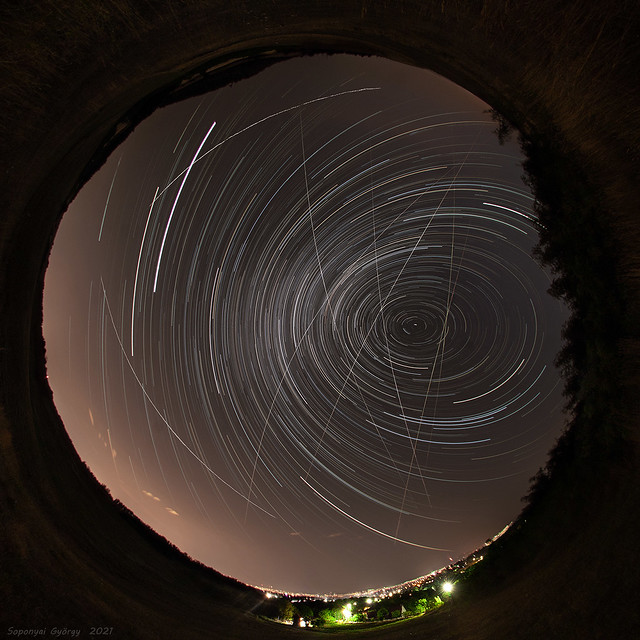
Technical details:
2021-07-12, 2021-07-15
Canon EOS 5D Mark II + Sigma EF 8/4.0
583 x 60 sec, f/4, ISO 500 (startrails: 187 x 60 sec on the second night)
Copyright: György Soponyai
Maybe this photo is rather interesting than spectacular.
The International Space Station orbits the Earth with an average altitude of 420 km and inclination of 51.6°. Due to this high inclination, four times every year during a less-than-a-week-long period the ISS is being illuminated by the Sun continuously so it's visible and observable the whole night from the Earth. These periods are called High Beta Angle Seasons. Two of these periods (in May and July) are visible on the middle and high latitudes of Northern Hemisphere, the rest two periods (in November and January) are visible on the Southern Hemisphere.
The second Northern HBA period of the year occurred this week and I was able to observe and capture eight transits of the Space Station during two moonless and cloudless nights near Mogyoród, Hungary. Recently the sky above Europe is full of Saharan dust as it's clearly visible over the horizon.

Technical details:
2021-07-12, 2021-07-15
Canon EOS 5D Mark II + Sigma EF 8/4.0
583 x 60 sec, f/4, ISO 500 (startrails: 187 x 60 sec on the second night)
- the_astronomy_enthusiast
- Ensign
- Posts: 98
- Joined: Fri Apr 16, 2021 10:16 pm
- Contact:
Re: Submissions: 2021 July
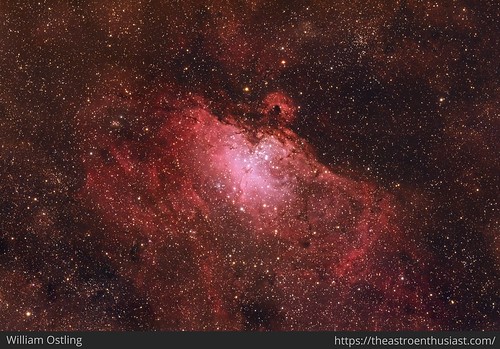 The Eagle Nebula by William Ostling, on Flickr
The Eagle Nebula by William Ostling, on FlickrEquipment:
- Nikon D90 (Astro-Mod)
Sky-Watcher Star Adventurer
Sky-Watcher Tripod
AF-S NIKKOR 500mm f/5.6
Bahintov Mask
Intervalometer
Laptop
All Sky Plate Solver
Sharpcap
Stellarium
- ISO 800
f/5.6
Bortle 2-4
Taken on 7/11, 12, 13 in 2021
732 light frames x 1 minute (taken across three nights)
500 bias frames
50 dark frames per night (150 total)
100 flat frames per night (300 total)
- Manually stacked in pixinsight
Crop to remove stacking artifacts
DBE
Deconvolution
EZ Denoise
Soft Histogram stretch
Starnet
Masked Stretch
Add stars back
Curves transformation
HDR multiscale transform
Local Histogram Equalization
- carlos uriarte
- Ensign
- Posts: 38
- Joined: Sun Oct 13, 2019 6:17 pm
Re: Submissions: 2021 July
I am pleased to introduce you to the Tulip Nebula. Sh2-101. In the cygnus constellation.
Image made in Hubble palette. Accumulating 45 hours of exposure, in 60 sub-shots of 15 minutes for each filter (Ha, OIII, SII).
The photograph is taken from the skies of Ager, through my remote observatory.
The equipment used consists of a Takahashi FSQ106 telescope, an ATIK460EX MONO CCD, a Paramount ME mount, and 31mm astrodon filters.
The capture program has been SGPro, and the processed Pixinsight and Photoshop.
The image shows the cygnus X1 shock arc. A powerful black hole that we can observe thanks to the force it makes and causing that arc. Is awesome.
Without further ado, I hope you like the image made.
Thanks!!!
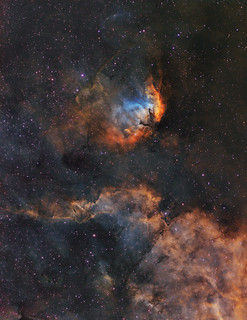 Sharpless 2 101 by Carlos Uriarte, en Flickr
Sharpless 2 101 by Carlos Uriarte, en Flickr
Image made in Hubble palette. Accumulating 45 hours of exposure, in 60 sub-shots of 15 minutes for each filter (Ha, OIII, SII).
The photograph is taken from the skies of Ager, through my remote observatory.
The equipment used consists of a Takahashi FSQ106 telescope, an ATIK460EX MONO CCD, a Paramount ME mount, and 31mm astrodon filters.
The capture program has been SGPro, and the processed Pixinsight and Photoshop.
The image shows the cygnus X1 shock arc. A powerful black hole that we can observe thanks to the force it makes and causing that arc. Is awesome.
Without further ado, I hope you like the image made.
Thanks!!!
 Sharpless 2 101 by Carlos Uriarte, en Flickr
Sharpless 2 101 by Carlos Uriarte, en Flickr-
nicola montecchiari
- Ensign
- Posts: 64
- Joined: Tue Sep 14, 2010 3:14 pm
- Location: Milano, Italy
- Contact:
Re: Submissions: 2021 July
The Pilars of Creations
https://www.astrobin.com/tdzreh/
https://flic.kr/p/2mc4xAP
Copyright: Sady Contreras
https://flic.kr/p/2mc4xAP
Celestron EdgeHd 11" x0.7
Ioptron Cem70
ZWO ASI2600mm Pro
ZWO EFW
ZWO ASIAIR PRO
Filters SHO Astronomik
Ha 24x300"
Oii 23x300"
Sii 23x300"
Boxrtle 6
Pixinsight
Santiago, Chile
https://www.astrobin.com/tdzreh/
https://flic.kr/p/2mc4xAP
Copyright: Sady Contreras
https://flic.kr/p/2mc4xAP
Celestron EdgeHd 11" x0.7
Ioptron Cem70
ZWO ASI2600mm Pro
ZWO EFW
ZWO ASIAIR PRO
Filters SHO Astronomik
Ha 24x300"
Oii 23x300"
Sii 23x300"
Boxrtle 6
Pixinsight
Santiago, Chile
Last edited by bystander on Mon Jul 19, 2021 7:44 am, edited 1 time in total.
Reason: All <img> tags require an image url not a page url
Reason: All <img> tags require an image url not a page url
Re: Submissions: 2021 July
Pickering's Triangle
https://www.astrobin.com/full/kutt5f/0/
Explore Scientific ED152CF
ZWO ASI2600MC Pro
Optolong L-eXtreme 2" filter
85x300"
Bortle 4
Scappoose, Oregon
https://www.astrobin.com/full/kutt5f/0/
Explore Scientific ED152CF
ZWO ASI2600MC Pro
Optolong L-eXtreme 2" filter
85x300"
Bortle 4
Scappoose, Oregon
-
Yovin Yahathugoda
- Ensign
- Posts: 21
- Joined: Tue Feb 09, 2021 2:56 pm
Re: Submissions: 2021 July
Rosette Nebula
https://www.astrobin.com/users/YovinRY/
Copyright: Yovin Yahathugoda
Full quality version here: https://cdn.astrobin.com/images/86236/2 ... 03d331.jpg
Telescope - Takahashi FSQ-106ED
Camera - FLI PL16803
Filters - Astrodon Ha, SII & OIII
Software - Photoshop 2020, PixInsight & Topaz Denoise AI
Location - IC Astronomy Observatory, Spain
Luminance - Synthetic luminance
Halpha - 13x300s, 22x600s
SII - 7x300s, 12x600s
OIII - 14x300s, 15x600s
Total Exposure time - 11 hours
Full acquisition details at https://www.astrobin.com/cw6bl2/
https://www.astrobin.com/users/YovinRY/
Copyright: Yovin Yahathugoda
Full quality version here: https://cdn.astrobin.com/images/86236/2 ... 03d331.jpg
Telescope - Takahashi FSQ-106ED
Camera - FLI PL16803
Filters - Astrodon Ha, SII & OIII
Software - Photoshop 2020, PixInsight & Topaz Denoise AI
Location - IC Astronomy Observatory, Spain
Luminance - Synthetic luminance
Halpha - 13x300s, 22x600s
SII - 7x300s, 12x600s
OIII - 14x300s, 15x600s
Total Exposure time - 11 hours
Full acquisition details at https://www.astrobin.com/cw6bl2/
